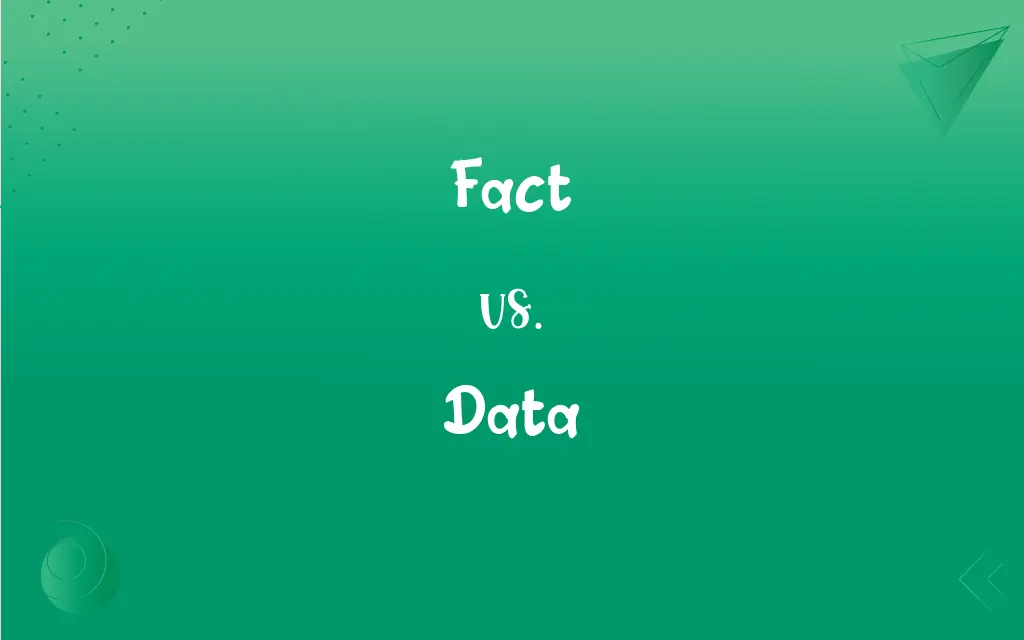Fact vs. Data: What's the Difference?
Edited by Aimie Carlson || By Janet White || Updated on February 5, 2024
"Fact" is an indisputable reality or truth; "data" are pieces of information, often used as a basis for reasoning or calculation.

Key Differences
A "fact" is a statement that can be proven to be true or false, representing a piece of reality or a piece of confirmed information. "Data," in contrast, refers to raw, unprocessed information collected for analysis, without any inherent truth value until it is interpreted. Facts stand on their own as pieces of verified truth, while data require processing and interpretation to derive meaning or establish facts.
Facts are often used to support arguments or theories, serving as evidence because of their undeniable truth. Data, however, are the building blocks that need to be analyzed or interpreted to support or refute a claim, theory, or observation. The relationship between fact and data is fundamental; data can lead to the establishment of new facts when they are systematically analyzed and verified.
In the realm of science and research, facts are conclusions drawn from data that have been carefully collected, analyzed, and verified against established criteria. Data, collected through observation, measurement, or research, are essential for the scientific method, but they do not become facts until they have been validated through replication and peer review. This distinction highlights the dynamic process of turning data into factual knowledge.
Facts are often seen as static elements of knowledge that do not change unless disproven, while data are dynamic and can be updated or expanded with new findings. The interpretation of data can lead to different conclusions, showing that while facts aim to represent unchanging truths, data embody the potential for multiple interpretations and the evolution of understanding.
Understanding the difference between fact and data is crucial for critical thinking and informed decision-making. Facts provide the foundation for reliable knowledge and informed opinions, whereas data are the raw materials that researchers and analysts use to uncover truths, patterns, and insights. The transition from data to fact involves rigorous analysis and verification, underscoring the value of both in the pursuit of knowledge and truth.
ADVERTISEMENT
Comparison Chart
Definition
An indisputable truth or reality
Raw, unprocessed information
Role
Serves as evidence or support
Requires analysis to provide insight
Nature
Static and unchanging unless disproven
Dynamic, subject to interpretation
Source of
Conclusion drawn from analysis
Collected through observation or measurement
Usage
To affirm truths or realities
To collect, analyze, and derive conclusions
ADVERTISEMENT
Fact and Data Definitions
Fact
A truth known by actual experience or observation.
Water boils at 100°C at sea level is a scientific fact.
Data
Digital information stored for processing.
The company's server holds vast amounts of customer data.
Fact
A piece of information about a circumstance that existed or has occurred.
The sky appears blue from Earth during the day is a fact.
Data
Facts and statistics collected together for reference or analysis.
The research paper includes data from multiple experiments.
Fact
An actual occurrence or event.
The moon landing in 1969 is a historical fact.
Data
Pieces of information collected for reference or analysis.
The survey collected data on consumer preferences.
Fact
Something demonstrated to exist or known to have existed.
Gravity is a fact that affects all physical objects.
Data
Quantitative or qualitative values that describe something.
The scientist recorded temperature data every hour.
Fact
A statement proven to be true.
The Earth orbits the Sun is a fact in astronomy.
Data
Information in a form suitable for processing by a computer.
The application requires user input data to function properly.
Fact
Knowledge or information based on real occurrences
An account based on fact.
A blur of fact and fancy.
Data
Plural of datum
Fact
Something demonstrated to exist or known to have existed
Genetic engineering is now a fact. That Chaucer was a real person is an undisputed fact.
Data
Information, especially in a scientific or computational context, or with the implication that it is organized.
The raw information was processed and placed into a database so the data could be accessed more quickly.
FAQs
Why is data considered raw?
Data is considered raw because it consists of unprocessed information that requires analysis to derive meaning or conclusions.
What role does technology play in data analysis?
Technology plays a crucial role in data analysis by providing tools and platforms to collect, store, process, and analyze large volumes of data efficiently.
Can data be misleading?
Yes, if data is incomplete, inaccurately collected, or improperly analyzed, it can lead to misleading conclusions.
How do facts contribute to knowledge?
Facts contribute to knowledge by providing verified information that forms the basis of understanding, reasoning, and informed decision-making.
What is the significance of data privacy?
Data privacy is crucial to protect individuals' personal information from unauthorized access and misuse, maintaining trust and compliance with laws.
How is data transformed into actionable insights?
Data is transformed into actionable insights through analysis and interpretation, applying statistical, computational, and logical methods to inform decisions.
Can data become a fact?
Yes, through analysis and verification, data can lead to the establishment of facts.
How do scientists ensure data integrity?
Scientists ensure data integrity through rigorous methods of data collection, validation, peer review, and adherence to ethical standards.
How can one verify a fact?
A fact can be verified through evidence, such as experimental results, historical documents, or reliable sources that confirm its truth.
Can a fact be subjective?
No, facts are objective and based on evidence; subjectivity implies personal interpretation, which pertains more to opinions.
How do biases affect data interpretation?
Biases can lead to selective interpretation of data, potentially skewing conclusions and undermining the objectivity needed for factual accuracy.
What is the relationship between data science and facts?
Data science plays a key role in discovering facts by using statistical and computational techniques to analyze and interpret data, thereby uncovering new truths and insights.
Can a fact change over time?
A fact can change if new evidence disproves it or provides a more accurate understanding.
What makes a fact different from an opinion?
A fact is an objective reality that can be proven with evidence, while an opinion is a subjective belief based on personal feelings, thoughts, or attitudes.
What is the difference between qualitative and quantitative data?
Qualitative data describes qualities or characteristics, while quantitative data is numerical and can be measured.
Is all data factual?
Data are neutral; they become factual when validated and accurately interpreted.
How do researchers use data?
Researchers collect, analyze, and interpret data to draw conclusions and establish facts.
Are historical events considered facts?
Yes, historical events are considered facts if they are supported by evidence and documentation.
How important is data in decision-making?
Data is crucial in decision-making as it provides the evidence needed to make informed choices based on analysis and trends.
Can facts exist without data?
While facts can be established through direct observation, most facts rely on data for their validation and are often derived from analyzed data.
About Author
Written by
Janet WhiteJanet White has been an esteemed writer and blogger for Difference Wiki. Holding a Master's degree in Science and Medical Journalism from the prestigious Boston University, she has consistently demonstrated her expertise and passion for her field. When she's not immersed in her work, Janet relishes her time exercising, delving into a good book, and cherishing moments with friends and family.
Edited by
Aimie CarlsonAimie Carlson, holding a master's degree in English literature, is a fervent English language enthusiast. She lends her writing talents to Difference Wiki, a prominent website that specializes in comparisons, offering readers insightful analyses that both captivate and inform.































































